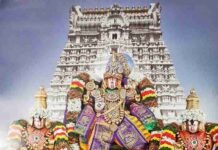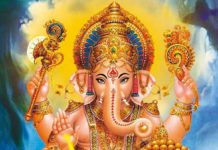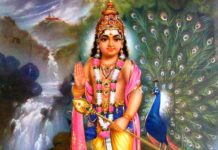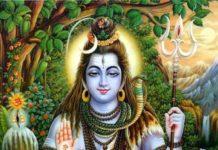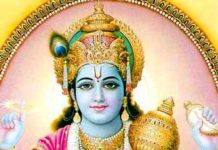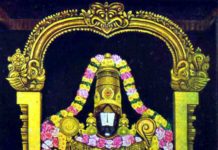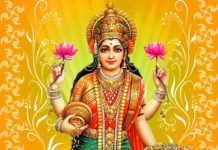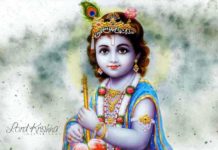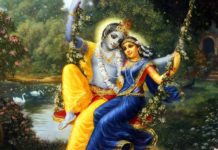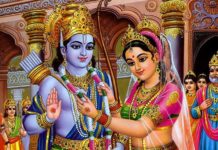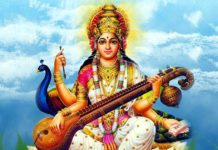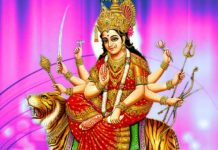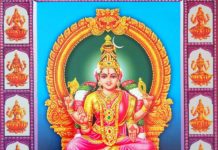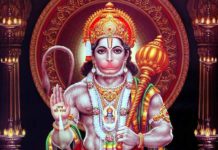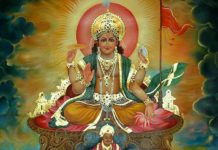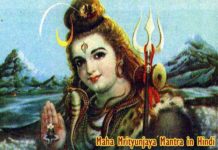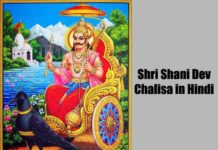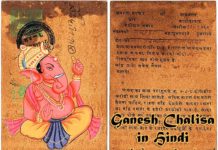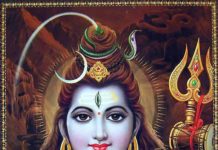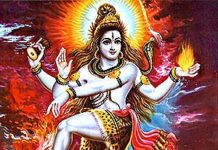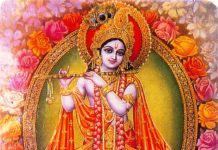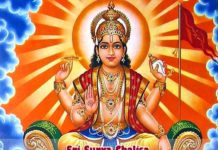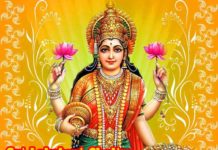Papamochani Ekadashi is the eleventh day from the Pournami day (Krishna Paksha Ekadashi) which occurs on the Krishna Paksha Ekadashi Tithi of the Phalguna month as per Amantha and the Chaitra month as per Purnimantha Calendars.
Papamochani Ekadashi occurs on Friday, 4th April 2024. The exact duration of the Ekadashi Tithi has to be ascertained from the respective regional calendars.
Papamochani Ekadashi is observed after Holika dahan and before Chaitra Navarathri. As the name suggests, the observation of this Vrat is believed to relieve the effects of sins which are committed knowingly or unknowingly. The following of this Vrat is also believed to prevent persons from committing misdeeds.
Legend
As per the legend, this Vrat is said to be mentioned in Sri Bhavishyothra Puran. It is said to be narrated by Sage Lomasa to King Mandhatha.
The legend is also believed to be described by Bhagwan Sri Krishna to King Yudhishtra.
Chaithratha
He was the leader of Gandharvas, the celestial artists. With the onset of spring season, he and his group of musicians and dancers had chanced upon a lush forest place. They were impressed with its beauty.
They have camped there doing dances and music. Even Indra, the King of Devas joined them in the revelry.
In the same forest, many Sages and Yogis were doing penance and other spiritual activities. In total, the forest was a serene as well as scenic place.
Sage Medhavi
There was a young Sage named Medhavi in the forest. He was the son of the Chief Sage Chyavna Muni. Medhavi was radiant due to his yogic powers. He was a sterling youth.
The Gandharva maidens who were camping there had an eye on him. They tried to get his attention in many ways. None of their attempts worked.
Manjughosha
Of the Gandharva Girls, a girl named Manjughosha was steadfast in achieving her aim. She had fears on the powers of Medhavi. So, she was contemplating ways to approach him without instigating him.
She set up a tent a good distance away from Medhavi’s abode. There she was singing songs very soulfully.
Manmadha
Manmadha, the God of love, came to her tent. He was mesmerized with her beauty. He adored her singing also. As his job was to create love, he had decided to make her object fall for her.
Manmadha’s past
Earlier, when Bhagwan Shiva was doing penance, Manmadha shot an arrow on Him. He did so on the suggestion of Devas. But Bhagwan Shiva had burned him down. Based on the requests of Manmadha’s wife Rathi, Bhagwan Shiva had revived him.
Manmadha’s plot
Thinking of his past, Manmadha thought that he could get vindication by kindling the interests of Sage Medhavi towards Manjughosha.
So, he prepared his five thronged arrow and his sugarcane bow. The five thronged arrow represents five senses such as touching, seeing, tasting, hearing and smelling. These senses are vital for making and living life.
He told Manjughosha that he was going to assist her in her quest. He took her to the presence of Medhavi.
Manjughosha’s efforts
Standing before Medhavi, Manjughosha lost her head. She started to sing soulfully. The bells in her anklets and the bangles played accompaniment.
Medhavi was enchanted to hear the song. He opened his eyes and saw her. By that time, Manmadha had also shot his arrow.
Medhavi’s reaction
Due to the efforts of Manmadha, Medhavi was not in a position to distinguish between right and wrong or day and night. He forgot all his penance and yogic attributes.
He too wanted to spend his time with Manjughosha.
Union
Medhavi and Manjughosha were together for longer years. Both of them did not notice the passage of time.
Realization
It was Manjughosha who came to her senses first. She realized that Medhavi had almost lost his spiritual powers because of their union. She had then decided to give up.
She told him, “Please permit me to go. We were together for a longer time”. Medhavi said, “We have met just now. Stay with me until the morrow”.
Then she realized that the passage of fifty seven years, nine months and three days in their union appeared to be just a moment for Medhavi. Manjughosha also realized that he still had retained some of his yogic powers.
Again, she told him, “Please allow me to leave”. He said, “why don’t you stay with me atleast for tonight? You can leave after I finish my morning rituals tomorrow”.
Fearing fiery reaction, she said, “how long will you take time for the morning rituals? Have you realized how much time you have spent with me?”.
This made Medhavi to retrospect.
Medhavi’s reaction
He reflected that he had spent fifty-seven years, nine months and three days with her. He got furious with her for making him lose his senses for that long.
His eyes were sparkling with anger. He said, “You have ruined all my spiritual accomplishments. The effect of my years’ long penance had gone utterly waste. I curse you to become a pishachi (wandering ghost).”
Manjughosha’s plea
She said, “it is believed that the benefit of associating with good persons provides instant gains. But the curses given by such good persons will take effect only after seven days. I have been with you for fifty-seven years. Please show mercy to me”.
Medhavi’s suggestion
He said “If you observe Papamochani Ekadashi Vrat which occurs in Chaitra month and if you go on fasting on that day, all your sins will be alleviated”.
She was glad of the suggestion and decided to follow it.
Sage Chyavana Muni
After leaving Manjughosha, Medhavi retuned to his father. His father Chyavana Muni was furious at his son for having lost his spiritual powers.
When Medhavi asked for forgiveness, he relented. Medhavi also pleaded for ways to atone his sins.
Sage Chyavana told him “do observe Vrat on Papamochani Ekadashi day. All your sins, however grievous, will fade away”.
Medhavi proceeded to do so.
Alleviation of sins
Medhavi had observed fasting on Papamochani Ekadashi day and his sins were atoned. Manjughosha also had observed fasting on that day. Her sins were alleviated. Her curse left her. She reached back to Gandharva loka.
Papamochani Ekadashi – other names
-Vaishnava Papamochani Ekadashi
-Guruvar Ekadashi (if it occurs on Thursday)
Rituals
The general rituals followed for Ekadashi Vrats are given below:
-The exact time of dawn of Ekadashi tithi is ascertained either from family elders / astrologers. It is mentioned in the Holy Almanac (Panchang) as well. Even daily Calendars provide the information.
-The idol or picture of Sri Vishnu is decorated with flowers. Incense sticks are lit. Diyas are lit with ghee. Pujas are done with tulsi leaves.
– The items such as Jambira fruit (goose berry), Pomegranate, Mangoes, Guava, Betal nuts and leaves, Coconut, Varieties of nuts and Cloves and other aromatic spices are offered in Puja subject to availability.
Slokas or stotras of Sri Maha Vishnu including Sri Vishnu Sahasra Nama are recited with devotion. Srimad Bhagavad Gitaa is also recited.
-Special Puja is done for Sri Lakshmi Devi as well.
-The Vrat Katha is read and recited.
-At the end of the puja, aarti is done. Prasad is distributed to the family members.
-Devotees of Bhagwan Maha Vishnu observe strict fasting from the dawn of Ekadashi.
-They do not sleep on the night of Ekadashi. At this time, tales of Sri Maha Vishnu are recited by the elders. Others listen to the stories.
-Various bhajans and kirtans are held.
-The fast shall continue till the sunrise of the next day, i.e., Dwadashi.
-Those devotees who cannot do fasting due to medical or other reasons can take sattvic food. Mostly prasadams and fruits are partaken.
-Making daan / donation to the needy on Ekadashi day is believed to please Sri Maha Vishnu.
-On Dwadashi day, unless it happens to be another Vrat day, a nutritious meal is partaken to balance the internal physical effects of fasting on the previous day. It is considered pious to forego eating of brinjal on Dwadashi day.
Specially for Papamochani Ekadashi, listening to the Vrat Katha is important.
Benefits
Observation of Papamochani Ekadashi is believed to be more fruitful than the pilgrimage to Vishnu temples and donating thousand cows.
The other possible benefits are
-Removal of sins of past and present births; and
-Removal of effects of curses and ill-will from others.
Even listening to the merits of Papamochani Ekadashi bestows the same benefits as observing the Vrat.
Importance should be given to the sincere prayers to Sri Maha Vishnu.
The synopsis of Kamada Ekadashi, Varuthini Ekadashi, Mohini Ekadashi, Apara Ekadashi, Nirjala Ekadashi, Yogini Ekadashi, Devshayani Ekadashi, Kamika Ekadashi, Sravana Putrata Ekadashi, Aja Ekadashi, Parivarthini Ekadsshi, Indra Ekadashi, Papankusha Ekadashi, Rama Ekadashi, Dev Uttanna Ekadashi, Uthpanna Ekadashi, Mokshada Ekadashi, Saphala Ekadashi, Shattila Ekadashi, Bhishma Ekadashi, Vijaya Ekadashi and Amalaki Ekadashi are narrated in the previous articles.




